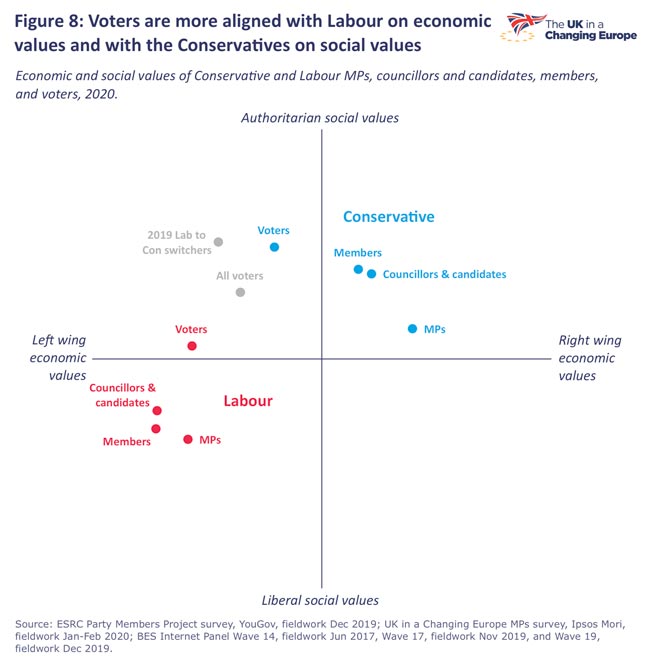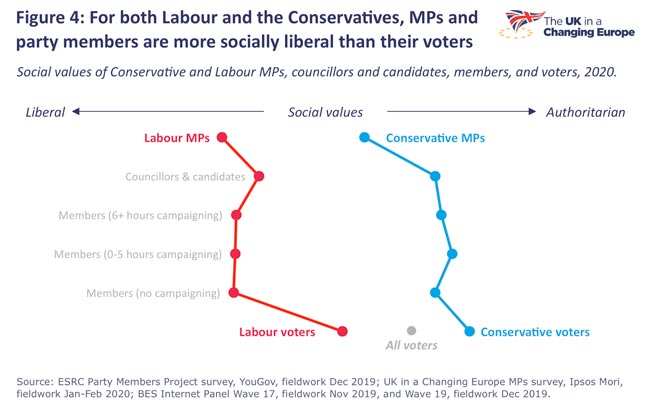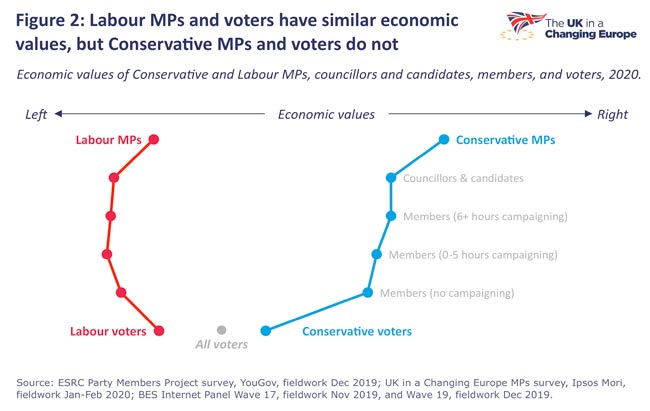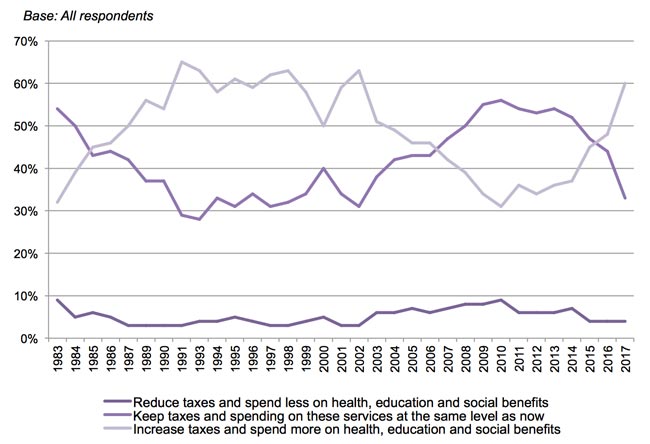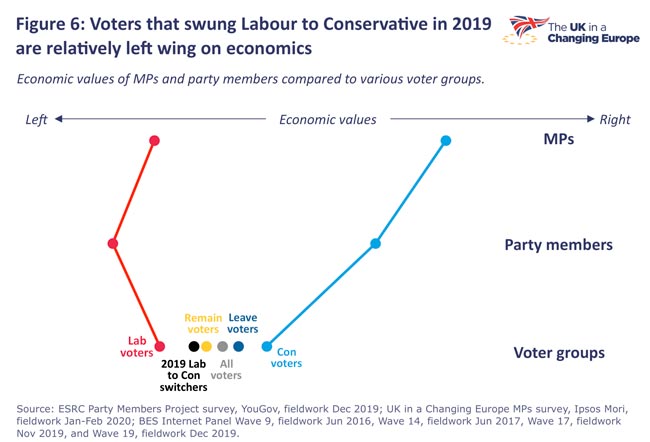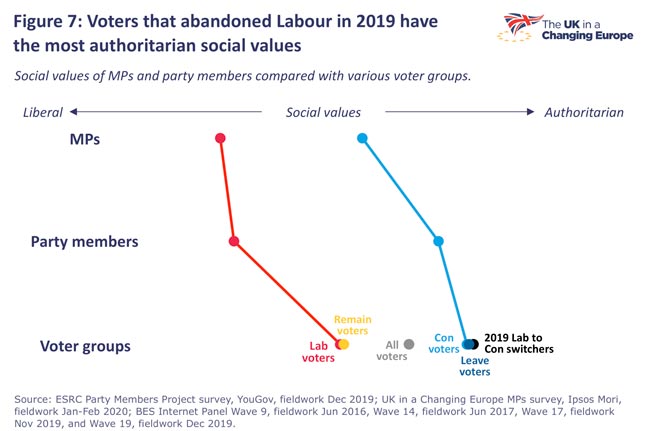
The culture wars are bad for the Left and good for the Right, and the reasons are very clear after reading the report published last week by ‘The UK in a Changing Europe’ think tank entitled “Mind the values gap – the social and economic values of MPs, party members and voters”
The report charts the different values of politicians, party activists and voters using two sets of questions commonly used by social scientists to measure people’s economic and social values. These questions are designed to tap into underlying, stable, long-term ideological attitudes rather than ephemeral, short-term policy preferences. The report contains a lot of finely nuanced data and observations, and is well worth a look. In this article I want to focus attention on some key findings that have big political implications, if you want to see the methodology that produced these results have a look at the report itself.
Measured on a spectrum between authoritarian and liberal social values and Left wing versus Right wing economic values Labour and Conservative MPs, councillors and activists fall more or less where you would expect them to be on both the social and economic scales. Labour fall into the socially liberal and economically left-wing quadrant while the Tories in the opposite one.
Importantly the values of voters are significantly different to those of the politicians and party activists that seek to represent them. There have now been a number of studies which show consistently and fairly convincingly that British voters tend towards the economically left-wing and the socially conservative. I wrote about this in an article entitled “Labour and the new terrain of politics”. In general voters are more aligned with Labour on economics and more aligned with the Conservatives on social issues. This is especially true in those constituencies traditionally held by Labour that were won by the Tories in the most recent election. That’s why the Conservatives like to fight the cultural wars, it gives them a lever to pry away Labour supporters.
The first interesting thing to emerge from the recent ““Mind the values gap” report is the very clear and big gap between MPs and voters on the same side. Labour MPs are more socially liberal than Labour voters, and Tory MPs are more socially liberal than Tory voters. In fact Tory MPs have, on average, about the same social values as Labour supporters, and are are more socially liberal than the average voter. The entire governing elite is in reality more socially liberal than the electorate.
So if the MPs of both parties are more liberal than the electorate what divides them? Here the report is very clear. It’s economics. When it comes to economics Tory MPs are to the right of their councillors and activists and really a long way to the right of their voters. Interestingly the economic values of Labour MPs almost perfectly aligns with Labour voters whilst Labour councillors and activists tend to be more left wing on the economy than either their MPs or their voters.
The right wing economic ideology that took hold of the Tory Party in the late 1970s and which still grips it – the obsession with market based solutions and privatisations, deregulation and reducing job security, shrinking the state – is not popular with the electorate. There was a period in the late 1970s and early 1980s when right wing economics had some popular traction but by the 1990s support for reducing taxation and cutting public expenditure on social programs was no longer popular with the majority of the electorate. There was a brief period after the the financial crisis, as public debt shot up and Labour led by Milliband refused to defend the record of the previous New Labour governments, when support for reducing public expenditure declined sharply but that time has passed. Now the electorate are broadly and clearly to the left of the Tories on economic policy. Meanwhile although the party leadership has begun to shift leftward somewhat the Tory Party as a whole remains broadly committed to right wing economic policy.
If the country is so left wing on economics why does it continue to elect the party with a right wing economic policy? The answer is that right from the time of Thatcher a consensus actually governed UK politics, this consensus was based on Labour – sort of – giving up the economic war and the Tories – sort of – giving up the social war.
In the article “Labour and the new terrain of politics” I wrote “the last thirty years, the era of so called Neo-Liberalism – almost amounted to a sort of trade off: tolerance for diversity, minority rights and discrimination laws balanced by privatisation, deregulation and tax cuts. This meant that policies that were still very popular with sizeable groups of voters, especially working class voters, were no longer on the political agenda of any party. Policies such as renationalisation and high taxes on the rich, the restoration of capital punishment and cuts to immigration, were utterly marginalised along with the politicians who espoused them. The effect was to take a whole series of policies, that were actually quite popular, off the political agenda, and increasingly it meant that a sizeable constituency developed of people who felt essentially unrepresented by any mainstream party.”
This unrepresented bloc of voters, who lean Left on economics but Right on social issues, grew and and as it did so it began to destabilise politics. The fulcrum of the destabilisation, for reasons outside the scope of this article, was the issue of membership of the EU, and it was this bloc of economically progressive but socially conservative voters that fuelled the rise of UKIP.
From the time of the 2010 election it has been clear that even with Labour’s obliteration in Scotland the Tories were struggling to win a decisive majority and after politics was shown into chaos in the aftermath of the referendum, and the parties splintered, a new Tory political project began to emerge. It’s key components was to push hard on leaving the EU, thus trumping UKIP, sound old fashioned on some social issues and shift a bit to the Left on economics. Leaving aside how much the Tories under Johnson have really shifted leftward on economic policy, because the Corvid 19 events have derailed almost everyone’s plans, it is clear that the Tories can accumulate a lot of cheap political capital fighting the culture wars. The 2019 election was the first electoral outing for the new Tory project and it was spectacularly successful, Labour was crushed and the Tories won a bloc of new support in traditional labour heartland seats. If you look at the voters who switched to the Tories in 2019 a clear pattern emerges, Labour voters that swung to the Tories were still pretty leftwing on economic policy but were significantly more socially conservative, in fact more socially conservative than Tory MPs and Tory Party members.
As I watched the graffiti being scrawled in Churchill’s statue I thought what a political gift this was for the Tories. These sort of symbolic gestures make a lot of Left activists feel great but all this sort of thing does is to push big segments of the electorate into the arms of the Tories. All the Tories have to do is make a lot of noise about trivial events like a bit of petty vandalism and much of the electorate will be nodding along in agreement. Remember that there were only 330,000 votes between Theresa May’s humiliation and Boris Johnson’s triumph. If the Tories can focus attention on the sort of culture war posturing by the Left that really annoys a lot of ordinary people then they will remain in power. Never fight a political battle on the terrain chosen by your opponents. The Left should step back from the culture wars, stop trying to be Woke on every issue, and focus most of its political energies on progressive economic policy.
